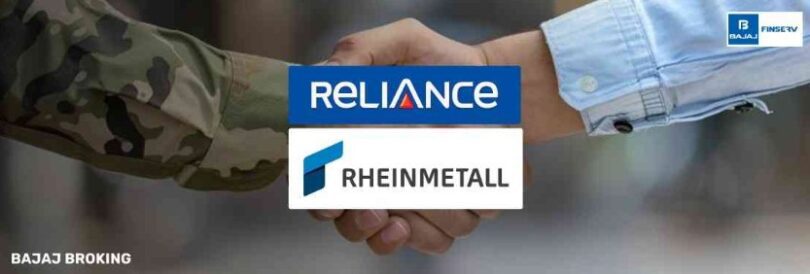On 25 June 2025 Reliance Infrastructure (BSE: 500390; NSE: RELINFRA), announced in an official filing, that its subsidiary Reliance Defence, had secured an INR 6,000 crore (EUR 59.8mln) export order from Germany’s Rheinmetall AG (RHM.DE).
The order is very important considering the global push for larger defense spending. It is one of the largest in the high-tech space and has given a significant push to the Anil Ambani led company. Furthermore, it marks a key milestone in Reliance’s strategy to deepen global defence partnerships and increase the producer’s recognition in international arms supply space. The partnership falls in line with India’s “Atmanirbhar Bharat” and “Make in India” missions.
Through this greenfield project, positioned to be the largest of its kind by a private entity in India’s defense space, the company will develop an integrated manufacturing facility under the Dhirubhai Ambani Defence City (DADC) banner in Ratnagiri, Maharashtra.
"The strategic partnership with Rheinmetall brings cutting-edge capabilities to India and represents a defining milestone for the country’s private defence manufacturing sector,” said Anil Ambani, Founder-Chairman of Reliance Group. "Our ambition is clear — to position Reliance Defence among the world’s top three defence exporters."
Rheinmetall CEO Armin Papperger reaffirmed the German firm’s long-term commitment to India, noting that the partnership reflects the confidence in India’s defence sector under Prime Minister Modi’s leadership.
The order is important for both sides. Viewed as a “tryout” order, it can give opportunities for additional production, further innovation, advanced production and export-oriented growth in the defence sector. From Rheinmetall’s announcement, “The Reliance manufacturing facility, one of the largest in South Asia, will have an annual capacity to produce up to 200,000 artillery shells, 10,000 tons of explosives and 2,000 tons of propellants. The cooperation gives Rheinmetall further access to important raw materials and secures not only its supply chains, also in the interests of its customers, but also creates further growth opportunities. In India, the new Reliance state-of-the-art facility will make a significant contribution to supplying the country's armed forces.”
Rheinmetall AG is one of the most prominent companies on DAX, Germany’s leading stock index. It is Europe’s fifth largest arms producer and while it was mostly known for its production of armored fighting vehicles and armored personnel carriers, its importance grew over the last couple of years as it turned out that it is one of the 2 producers of NATO used shells and ammo currently in use in the conflict in Ukraine. Considering that the other one is General Dynamics Corporation (NYSE: GD) which is based in the US, Rheinmetall AG is essentially the only European producer of such scale. As such, it is the prime recipient of the increased defense budget plans.
Management, however, is the big difference between Rheinmetall AG and General Dynamics. Rheinmetall’s CEO, Armin Papperger has lead a tight ship eliminating inefficiencies and looking for opportunities. Considering both manufacturers are responsible for filling up the void of used shells by Ukraine, their entire production was focused towards securing that demand. Still, since the beginning of the conflict in 2022, GD’s share price increased 28%, while Rheinmetall’s share price has steadily skyrocketed over 17 times what it was.
Considering the renewed objectives, earlier in 2025, the company announced that it would repurpose two of its automotive plants in Germany to mostly make defense equipment, highlighting the impact of an expected surge in spending in the region amid U.S. tensions over the Ukraine war. The company’s defense expansion affects its factories in Berlin and Neuss, where the company currently makes automotive parts, a business that has faced challenges as Germany's carmakers battle high costs and competition from abroad.
Under the plans, which still need to be finalised, both factories would become part of Rheinmetall's Weapon and Ammunition division and serve as so-called hybrid plants, ensuring some automotive production can still take place. They have, additionally, been looking into setting up other production facilities in various countries to be able to cope with the increased demand.
The surge for their products has positively affected their results. Their gross profit by YE 20245 increased 28.5% to EUR 5.1billion, EBIT 47.3% to EUR 1.36billion and EBITDA 43% to EUR 1.77billion. Profitability metrics also improved in Q1 2025 as Operating margin increased from 8.5% to 8.7% and EBIT margin went up from 6.8% to 7.6%. Operating Free Cash Flow went from negative EUR 181million to positive EUR 266 million, or an addition of EUR 454 million. Of the sales, the biggest push came from Germany (EUR 321 million additional, to get to EUR 690), Other Europe (EUR 205 million to reach EUR 972 million) and the Americas (EUR 136 million to get to EUR 321 million). The earnings per share (EPS) grew from EUR 1.10 in Q1 2024 to EUR 1.92 in Q1 2025.
Within their business segments, Vehicle systems sales increased twice adding EUR 459 million to reach EUR 952 million. The positive development is essentially due to increased deliveries of logistics vehicles and the continued start-up of tactical vehicle programs in Hungary and England. Loc Performance, which was acquired on November 29, 2024, contributed EUR 116 million to sales growth. Weapons and Ammunition grew 65.5% YoY to reach EUR 599 million. In addition to increased tank ammunition sales, several medium-caliber ammunition and artillery orders were key drivers of growth for NATO member states and Ukraine. Significant orders include an order for M107 artillery ammunition from Turkey and an order for Paveway IV airbombs and 35 mm medium-caliber ammunition from a customer in the MENA region. Electronic solutions increased 49.1% to EUR 427 million. The 49.1% increase in sales is essentially attributable to the delivery of headsets with hearing protection and the close-range air defence system (LVS NNbS), both for the German customer, as well as the delivery of further Skyranger and Skynex air defence systems, both to European customers.
The push to expand production in India comes clearly with the increased backlog – it went up from EUR 40.2 billion in Q1 2024 to EUR 62.6 billion in Q1 2025.
Reliance Infrastructure, on the other hand, experienced a boost of investor confidence from the news of the new partnership. During the first day of announcement, its shares increased 5% to INR 404.65 and on the next day, 26 June they reached INR 417.60, making for a total 8.5% gain. The amount of the order is comparable to the average quarterly revenue, which represents a significant push. Currently the company trades at 3.75 PE, which is significantly below Indian peers’ PE of 17.47 indicating a serious undervaluation and opportunities for growth.
On an additional positive note, they managed to decrease their debt reliance, decreasing short term borrowings by 39% and long term borrowings by 32%. Return on Equity is one of the highest among peers at 37.51% (others at 11%-20%), as well as Return on Assets at 12.93% (others at 3% to 8.75%). They lack at sales growth (3.45% vs figures exceeding double that), but once this project becomes operational, the company will record a significant push.
The above references an opinion by the author and is for information purposes only. It is not investment advice and should not be treated as such. The author does not suggest any strategy involving purchasing, selling or holding the abovementioned securities and their names and ticker symbols were mentioned so that readers can find and verify the information from publicly available resources, such as their financial disclosures or regulatory filings. For investment advice seek professional licensed entities in your jurisdiction.





![Pakistan and Saudi Arabia signed a defence agreement on September 17 in Riyadh [Handout/Pakistan Prime Minister's Office]](https://www.thestrategicperspective.org/wp-content/uploads/2026/01/pak-saudi-145x100.jpg)




